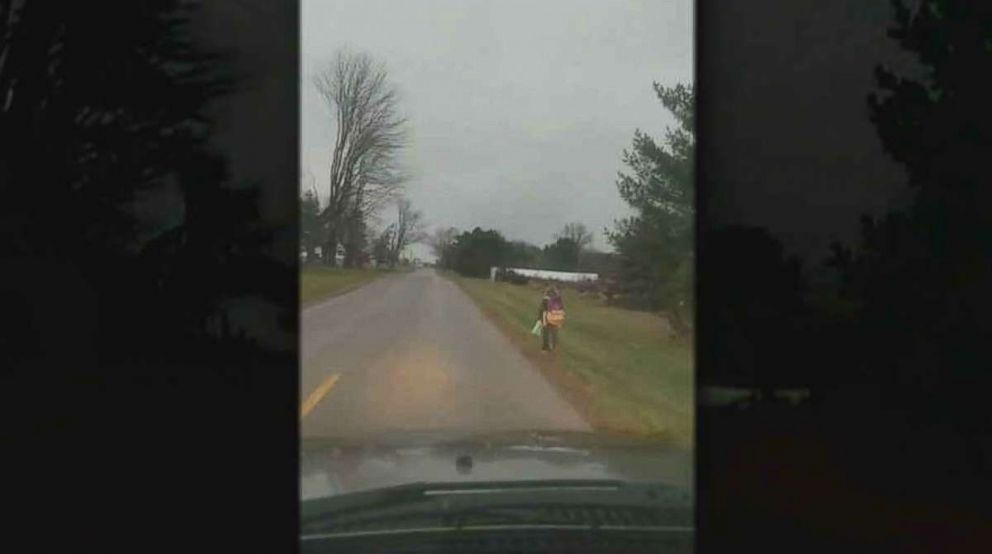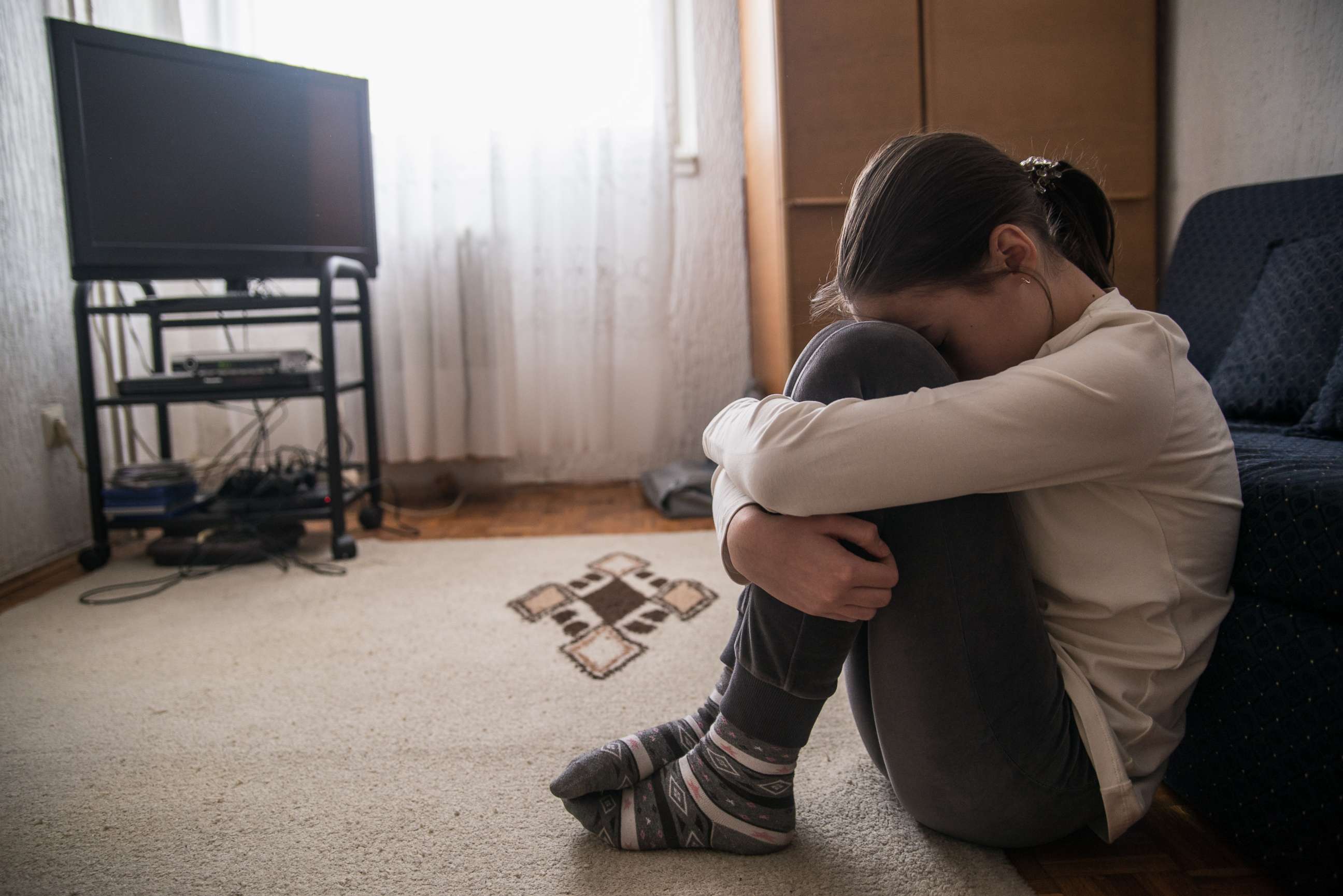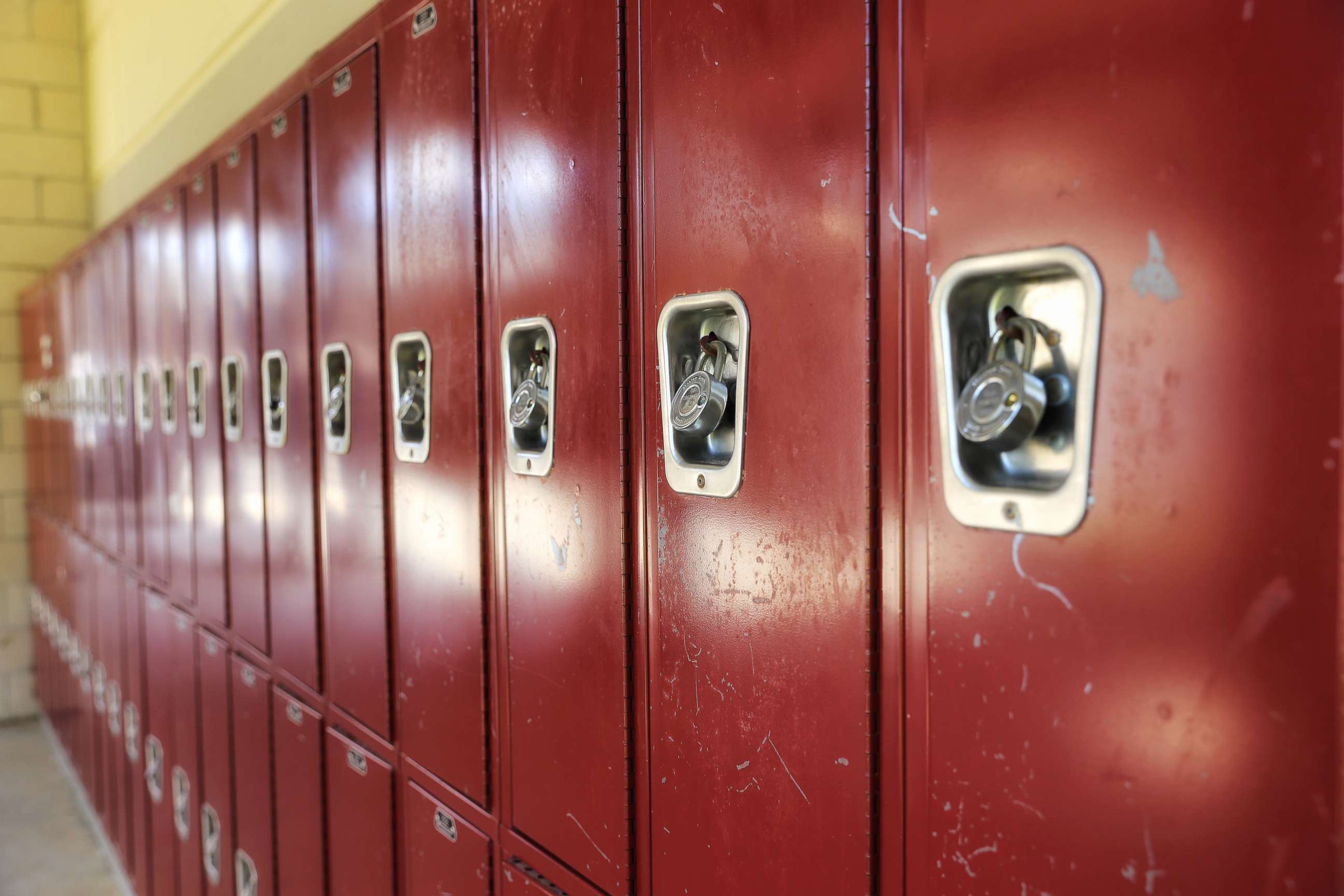Dad’s viral bullying punishment is ‘public humiliation,’ parenting experts say
An Ohio dad punished his daughter by making her walk 5 miles to school.
In the video, the 10-year-old girl trudges along an Ohio road, a neon backpack on her back. A car follows closely behind, narrating the journey.
"Today, my beautiful daughter is going to walk 5 miles to school in 36-degree weather," the girl's father, Matt Cox, says from behind the camera. "I know a lot of you parents are not going to agree with this, but that is all right. Because I am doing what I feel is right to teach my daughter a lesson and stop her from bullying."
From inside his car, Cox explains his daughter has been kicked off her school bus in Swanton, Ohio, twice this year for bullying. Cox says she told him he would have to take her to school while she is suspended from the bus.
"As you see this morning," he adds, "she is learning otherwise."

But psychologists and parenting experts say that might not be the lesson his daughter -- or the more than 20 million other people who have watched the video on Facebook alone this week -- learn from it at all. In the age of social media, videos like this one can live forever, and the shame they create can last longer than many parents realize.
"This is public humiliation," Sue Scheff, a parenting advocate, educational consultant and the author of "Shame Nation," told ABC News. "The internet can be so unforgiving, and your child will watch it over and over again online. It's like salt in an emotional wound, and the sting can take a long time to heal -- especially when it's a parent that did the shaming."
Dr. Krystine Batcho, a professor of psychology at Le Moyne College in Syracuse, said shaming by a parent packs an even stronger emotional punch.
"Unfortunately, it's true that shaming that is done by a parent or some other adult who is loved by and admired by a child, is, in a way, even worse than shaming by other children or someone a child doesn't care about," Batcho told ABC News. "When a parent shames a child, that has a much more powerful emotional impact, and it's very often remembered for life."
In an interview with ABC affiliate WTVG earlier this week, Cox said filming the walk to school was his way of taking bullying seriously and a "small way of trying to stop it in my household."
"Parents need to hold their kids accountable. That was me showing how I hold my kid accountable," Cox told WTVG. "I'm not going to be another parent that's just going to brush things under the rug and say, 'Kids will be kids.'"
'When a parent shames a child, that has a much more powerful emotional impact, and it's very often remembered for life.'
The reaction was swift -- and mixed. To date, the video has been shared more than 400,000 times and garnered 80,000 comments on Facebook alone from people both praising and criticizing Cox.
Dr. Laura Markham, a parenting expert and the author of "Peaceful Parent, Happy Kids," said had Cox told his daughter that if she bullies a student again, she'd have to walk, it would have been an acceptable punishment.
"If this did happen a second time, I think it is reasonable to not protect the child from the consequence of her actions. I would make sure she has warm clothes for the weather, and drive behind her as this father did, but I think letting her face the consequence from the school is fine, at least for one day," Markham told ABC News.
But there is an important distinction between Cox's decision to punish his daughter by making her walk and his decision to publicly post the video online, she said.
Creating an online record of it doesn't fix the underlying issue.
"Shame is not an effective way to change behavior. It makes us feel bad about who we are, so we are not empowered to be better. It's hard to act good when you feel self-loathing, which is what shame creates," Markham said. "Posting on social media about a child’s behavior frames her as 'that kid' in the eyes of others, and in her own eyes.
"It creates a permanent record online and in the minds of others," she added. "It is very hard to recover a positive sense of self after that, and kids can just spiral into worse behavior."
So how can parents effectively address bullying without putting their children down? Scheff, Markham and Batcho share five things to know.

Listen carefully and often
"Remain calm and listen," Scheff advised. "It's so important to not only listen and hear your child, but to get the full story. Don't go into instant panic mode that your child's a bully -- find out what's going on. If necessary, meet with the school principal or guidance counselor. It's very important your child knows you're their advocate, even in the bad times. I'm not condoning bullying, but we have to realize that hurt people do hurt other people, so let's find out what's really going on."
Explaining to your child your family's values -- and how bullying doesn't fit in with them -- is also important, Markham said.
'The internet can be so unforgiving, and your child will watch it over and over again online. It's like salt in an emotional wound, and the sting can take a long time to heal -- especially when it's a parent that did the shaming.'
"Dad needed to say, 'There are lots of ways to build yourself up: being kind, helping others, doing the right thing, being a hero. Picking on someone vulnerable and making them feel small may make you feel good for a moment. But it’s like candy, it’s not good for you,'" Markham explained. "'In our family, we make the world a better place just by being in it. We don't participate in hurting others; we're better than that. So next time you feel like acting like a bully, and next time someone else on the bus acts like a bully, what will you do?'
"Then he could say, 'I trust you to do that. Every day, at dinner, I look forward to hearing from you what happened on the bus that day. What you were tempted to do? How you handled that temptation. And how you found the hero inside you to be a good person and protect your own light,'" she added.
Find the underlying issue
Once those lines of communication are open, try to address the underlying issue: has the child been bullied themselves? Is this a way of regaining some kind of control over his or her life?
In Cox's case, his daughter told WTVG she "was bullied many times by bigger kids than me."
That supports research on why many children bully, Markham said.
"Start with the well-established scientific finding that when a child bullies, that child feels bad inside and is building herself up by making others feel small," Markham said.
'You never have to prove you're a good parent by posting on social media. That’s just self-aggrandizing. In fact, you’re building yourself up by making your child small, which is one of the definitions of bullying.'
Helping children understand what feelings they were getting out of bullying someone else is also key, Markham said.
"Was it that she just joined in with other kids to pick on someone vulnerable? Was it that the other child has been mean to her in the past and she is carrying a grudge? Was it that she gets to feel like a leader? She may not be able to explain her behavior, but having dad listen and have a real discussion -- without shaming and with understanding about the temptation to be mean that we have all felt -- would help her to see the point of view of the other child, and to see what she herself was getting out of acting like a bully," she said.

Don't shame
The key is to help a child understand that the behavior is wrong, but that they are still loved and valuable. Shaming can blur those lines.
"Shaming is social disapproval, it's saying: 'We don't like what you've done.' But unfortunately, it can very often be experienced as: 'We don't approve of you.' So it's a form of social rejection," Batcho explained. "The attempt to keep these categories separate and say, 'We still love our daughter but we just didn't like her bullying behavior,' that might be clear to the parents, but it's certainly going to be clear to the child.
"The problem with shaming as a strategy is not only is it a punishment -- and punishments tend to be ineffective in the long run -- but also it's also, in some respects, the worst kind of punishment. If it's used a number of times or if it's rather intense, and I would suggest in this example it's rather severe, it can be internalized by the child," Batcho continued. "We know that even very young children can internalize that and come to the conclusion that, 'I'm not a good person, people don't like me, I'm not worthy, I'm not valuable, I don't deserve to be loved, I don't deserve to be part of the group.' It's a form of social isolation."
That isolation can make things worse in the long run, she added.
Practice what you preach
Children model the behavior of the adults around them, including behaviors that can be negative, controlling or bullying. Shaming or humiliating a child who has shamed or humiliated others sends a mixed message, Batcho said.
"In a way, it's as ludicrous a logic as saying, 'I am going to teach you not to bully by bullying you,'" Batcho said. "A child who strikes out against another child and then the parent strikes the child says, 'I'm going to teach you not to hit someone by hitting you.' It's a very confusing logic to a child. The internet adds an entire other layer."
Face your problems, don't Facebook them
Scheff said the fact that Cox's video lives on endlessly on Facebook and in news reports can have consequences for both him and his daughter.
"Let's remember that social media is your online reputation today. You never know when this story will come back to haunt you," Scheff said. "If he applies for a job, or changes jobs, what will his potential employer think of this behavior? Your online behavior is a reflection of your offline character."
Markham said creating a "permanent record" of a child's bad behavior won't help them be good -- and just makes things worse.
"I would just ask these parents who post on social media –- what are you trying to prove?" Markham said. "Every parent is a hero just by getting up every morning being determined to do the best for their child. You never have to prove you're a good parent by posting on social media. That’s just self-aggrandizing. In fact, you’re building yourself up by making your child small, which is one of the definitions of bullying. So what are you modeling?"




